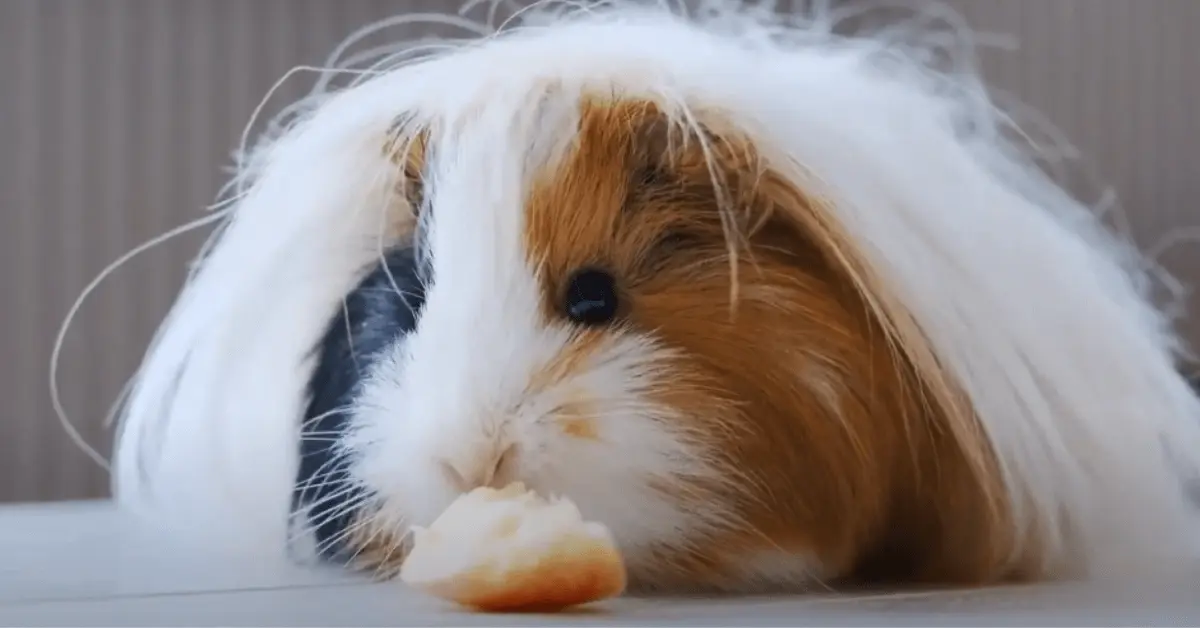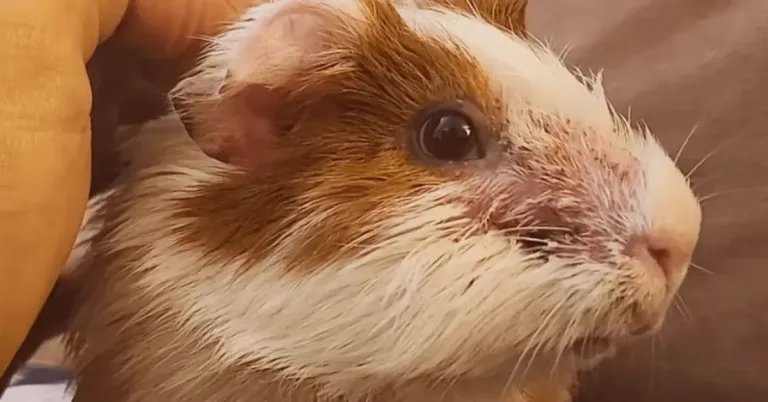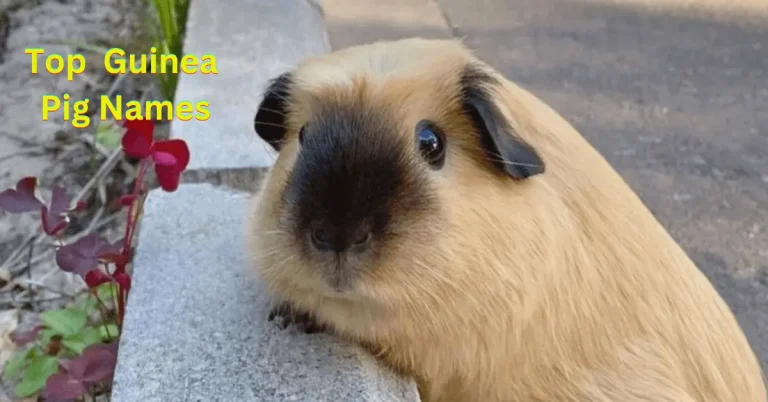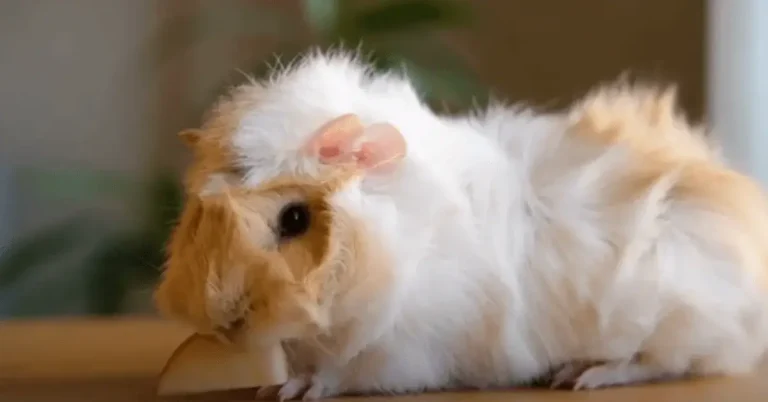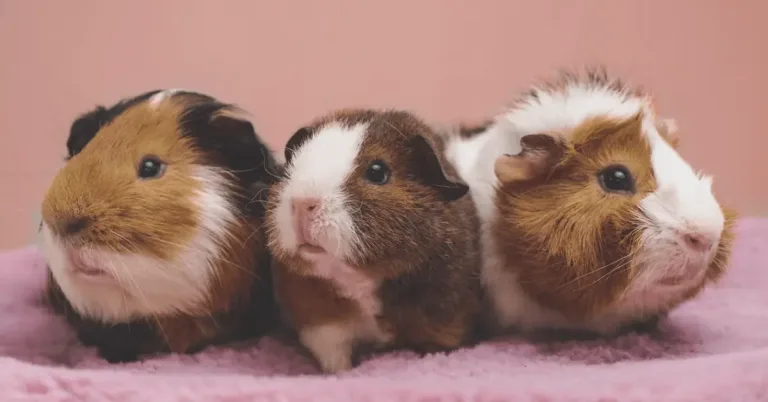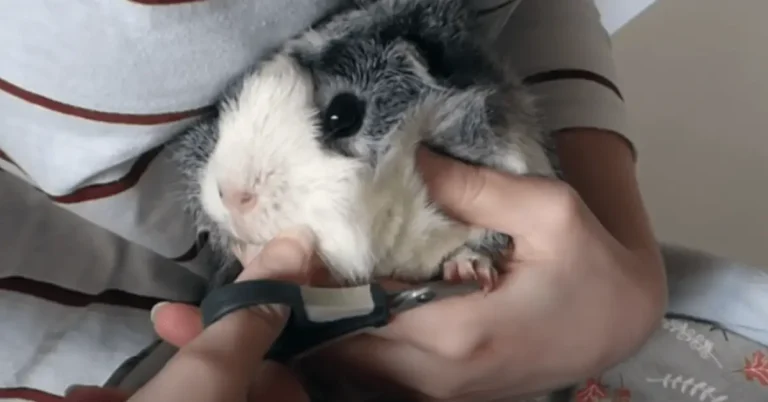Can Guinea Pigs Bite? Guinea pigs, those cute little rodents often called ‘cavies, have won the hearts of many pet owners with their friendly and social personality. While these small creatures are typically known for their wonderful behavior, there might be chances where guinea pigs bite. In this comprehensive guide, titled Can Guinea Pigs Bite? Understanding, Prevention, and Effective Responses we will explore guinea pig behavior, why they may bite, and what you can do to avoid and handle biting incidents.
Introduction to Guinea Pig Behavior
The Nature of Guinea Pigs
Guinea pigs are beloved pet rodents originally from the Andes region of South America. They are known for their small size, round bodies, and making unique sounds like squeaks, purrs, and chirps. With their soft fur, big eyes, and friendly personalities, guinea pigs are loved by people all over the world.
One great thing about guinea pigs is that they like being with others. They are herd animals, and in their natural habitat, they live in groups, providing safety and companionship. This social nature also makes them happy as pets, where they enjoy being around people and other guinea pigs.
Communication and Expressing Emotions
Guinea pigs are not just cute; they are also good at communicating. They use different sounds, body movements, and actions to show how they feel and what they need. Understanding their unique language is key to building a strong bond and ensuring their well being.
While guinea pigs are generally gentle and affectionate, they may sometimes bite. It is essential to recognize that guinea pigs don’t bite to be mean; there are typically underlying reasons for this behavior. To provide the best care for your guinea pig and maintain a harmonious relationship, it’s crucial to explore the potential causes of biting and learn how to prevent and respond to it effectively.
Why Do Guinea Pigs Bite?
Yes, guinea pigs can bite, but understanding the reasons behind guinea pig biting is the first step in addressing this behavior. Guinea pigs are not aggressive animals by nature, and their bites are typically responses to specific factors. Here are some common reasons why guinea pigs may resort to biting:
Feeling Scared
Just like any other living creature, guinea pigs can experience fear. When they feel threatened or frightened, then guinea pigs bite. This natural response is an attempt to protect themselves or stop whatever is causing the fear. Instances where guinea pigs may feel scared include being held too high in the air, being bullied by other guinea pigs, or being woken up suddenly during sleep.
Feeling Hungry
Guinea pigs really like to eat and might get a bit protective of their food. When they’re very hungry or if they’re competing with other guinea pigs for a favorite snack, then guinea pigs bite. This isn’t surprising, but there are ways to make it happen less often, as we’ll talk about in the part about preventing it.
Accidental Biting
Guinea pigs have a keen sense of smell, and they use their mouths to explore their surroundings. If your fingers have the scent of food on them or if you’re holding a chew toy, then a guinea pig may bite your fingers, thinking they are a snack. Generally, they quickly realize their mistake once they come into contact with your fingers.
Feeling Stressed
Guinea pigs, like all animals, can experience stress due to various factors. Stress can be induced by situations such as feeling scared, being bullied by other guinea pigs, living in a cage that’s too small, lacking a comfortable place to sleep, experiencing constant competition for a mate or food, or having an uncomfortable cage floor. Stress can make guinea pigs more reactive and likely to bite. Due to these reasons guinea pigs bite
Wearing Down Teeth
Guinea pigs have continuously growing teeth. To keep their teeth at a suitable length, they need to chew on objects regularly. This is a natural and necessary behavior, as overgrown teeth can lead to serious dental issues. If guinea pigs lack appropriate items to chew on, like a daily supply of hay, they may resort to gnawing on other objects, including your fingers.
Feeling Sick
Guinea pigs that are unwell may be more likely to bite. When they are not feeling their best, they may prefer not to be handled or bothered. If you or your child are attempting to handle a sick guinea pig or force them to eat, then guinea pigs bite this way is of communicating that they want to be left alone. Sudden biting by a guinea pig that has never bitten before is a strong indicator that they may be experiencing illness.

Feeling Pain
Pain, whether from an injury or discomfort, can occur when guinea pigs bite. If your guinea pig is sick, has been injured, is experiencing pain from some other source, or if they’re squeezed too tightly by you or your child, they may be more likely to resort to biting. It’s crucial to ensure that your guinea pig is not in pain before handling them.
Hormonal Changes
Hormonal changes can significantly impact guinea pig behavior, especially in males. Puberty occurs in male guinea pigs at around two to three months of age. If two intact males are housed together, then guinea pigs may bite each other or be more prone to biting you due to heightened testosterone levels. For this reason, it’s generally advisable to keep intact male guinea pigs separate to avoid fights. Female guinea pigs can also exhibit changes in behavior during their heat cycles, making them less social and less tolerant of other guinea pigs and handling.
Preventing Guinea Pig Biting
Preventing guinea pig biting is a vital aspect of responsible pet ownership. By taking specific steps to minimize the triggers that can lead to biting, you can provide a safer and more comfortable environment for your furry friend. Here are several key measures to help prevent guinea pigs bite:
Ensuring Adequate Space
Guinea pigs need room to move and explore in their living environment. A too small cage can lead to stress and territorial behaviors. Providing an appropriately sized cage with hiding spots, ramps, and platforms can make your guinea pig feel secure and reduce the likelihood of biting due to stress.
Providing Chew Toys
Guinea pigs bite so require objects to chew on to keep their teeth at the proper length. Ensure they have access to a variety of safe chew toys, as a well-chewed guinea pig is less likely to bite out of the need to wear down their teeth. Hay is an excellent natural option to include in their diet for dental health.
Respecting Their Sleep
Just like humans, guinea pigs need their sleep. Avoid waking your guinea pig suddenly, as this can startle them and lead to defensive behavior. Approach them gently and let them wake up at their own pace. This may help prevent guinea pigs bite.
Monitoring Health
Regular health checkups are crucial for guinea pigs. If you suspect that your guinea pig may be unwell, minimize handling and consult a veterinarian. A guinea pig in pain or discomfort is more likely to react defensively, including biting.

Separating Aggressive Guinea Pigs
If you notice that one of your guinea pigs is particularly aggressive towards others and the situation doesn’t improve, you may need to permanently separate them. Fighting among guinea pigs can lead to injuries and stress, and separation may be necessary to maintain a peaceful environment.
Recognizing Guinea Pig Communication
Guinea pigs communicate through various vocalizations and body language. Understanding these signals can help you respond appropriately and reduce your guinea pigs bite. For instance, if your guinea pig’s teeth are chattering, it might be a sign of annoyance or discomfort. Recognizing these cues can lead to better interactions.
The Importance of a Balanced Diet
A well balanced diet is crucial for guinea pigs to maintain their health and overall demeanor. Providing them with a consistent supply of fresh hay, fresh vegetables, and high-quality guinea pig pellets is essential. When they have access to the right foods, they are less likely to bite out of hunger, and their teeth stay in good condition, reducing the need to gnaw on other objects.
Handling and Socializing
Positive socialization is key to reducing guinea pig biting. Spend quality time with your guinea pig, talk to them gently, and give them treats so they enjoy being around people. When you want to touch them, do it slowly and with confidence, not suddenly or loudly. Gradually introduce them to handling, ensuring they feel safe and comfortable.

Play and Exercise
Guinea pigs are active animals that require mental and physical stimulation. Make sure they have fun things in their home, like tunnels, ramps, places to hide, and spaces to play. This way, they can use their energy and won’t get bored. When they are busy and having fun, they are less likely to nibble or bite. This way you can prevent Guinea pigs bite.
Consulting a Veterinarian
If you think your guinea pig is not feeling well, don’t touch them more than you need to, and go to the vet right away. Being sick can make them feel bad, and your guinea pigs bite. The vet can check what’s wrong and help them feel better.
By doing these things to stop it before it happens, you can make a safe and happy place for your guinea pig and make it less likely for them to bite. Also, learning how your guinea pig talks to you can help you take care of them better.
Responding to Guinea Pigs Bite
While prevention is the best approach to address guinea pigs bite, there may be situations where you or your child are faced with a bite. How you respond to a bite is critical in maintaining a positive relationship with your guinea pig. Here are steps to consider when responding to guinea pig biting:
Remain Calm
If your guinea pigs bite you, it’s essential to remain calm. While it may be surprising and possibly painful, reacting with fear or anger can exacerbate the situation. Do not shout or make sudden movements, as this can further stress your guinea pig.
Wash the Wound
After Guinea pigs bite, clean the wound with mild soap and warm water. Guinea pig bites can be prone to infection due to bacteria in their mouths, so proper wound care is essential.
Observe for Signs of Infection
After Guinea pigs bite, Keep a close eye on the wound for signs of infection, such as redness, swelling, or discharge. If you notice any concerning changes, seek medical attention promptly.
Seek Medical Attention
If Guinea pigs bite is deep or shows signs of infection, consult a healthcare professional. They can provide appropriate treatment, such as antibiotics or wound care, to prevent complications.
Evaluating the Guinea Pig’s Behavior
After a biting incident, it’s important to judge your guinea pig’s behavior. Consider what may have triggered the bite and whether there have been any changes in their health or environment. It’s possible that addressing these factors can help prevent future biting incidents.
Rebuilding Trust
Following a biting incident, rebuilding trust with your guinea pig is essential. Spend time with them, offering treats and gentle petting. Show them that you remain a source of comfort and care, rather than a threat.
When to Reintroduce Handling
When your guinea pig is comfortable and no longer exhibiting signs of stress or aggression, you can gradually reintroduce handling. Start with short and gentle sessions, ensuring your guinea pig feels secure and relaxed.

Related: How to cut Guinea Pig Nails?
The Special Consideration of Children and Guinea Pigs
Guinea pigs are popular pets for families, and children often play a significant role in their care. When children and guinea pigs interact, certain precautions and considerations are essential:
Guinea pigs Supervision
Always supervise interactions between children and guinea pigs. Children may not always understand the boundaries and signals of guinea pigs, and close supervision can prevent accidental bites or stress for both the child and the pet.
Educating Children
Teach children how to handle guinea pigs gently and respectfully. Emphasize the importance of approaching guinea pigs calmly and not startling them. Encourage empathy and responsible pet ownership.
Encouraging Empathy
Guinea pigs are excellent companions for teaching children about empathy and the needs of living beings. Involving children in the care of guinea pigs, such as feeding, cleaning, and spending time with them, can foster a sense of responsibility and understanding.
Additional Considerations for Guinea Pig Owners
Beyond understanding and addressing biting behavior, there are some additional considerations for guinea pig owners to ensure their pets live healthy and happy lives:
Routine Veterinary Care
Regular check ups with a veterinarian who is knowledgeable about guinea pigs are essential. These check-ups can help detect and address health issues early, ensuring your guinea pig’s well being.
Socialization and Companionship
Guinea pigs are social animals, and they often thrive when they have a companion of the same species. Consider adopting two or more guinea pigs to provide them with social interaction and prevent loneliness.
Clean Environment
Maintaining a clean and hygienic living environment for your guinea pig is crucial. Regularly clean their cage, provide fresh bedding, and ensure that food and water dishes are clean and filled.
Proper Diet
Guinea pigs have specific dietary requirements. Ensure they receive a balanced diet that includes fresh hay, high-quality guinea pig pellets, and a variety of fresh vegetables. Avoid feeding them foods that are harmful, such as foods high in sugar or caffeine.
Guinea pigs Enrichment
Guinea pigs benefit from mental and physical stimulation. Provide toys, tunnels, and activities to keep them engaged and prevent boredom.
Hydration to your cavy
Ensure that your guinea pig has access to clean, fresh water at all times. Dehydration can lead to health problems.
Safe Playtime
When allowing your guinea pig to have playtime outside of their cage, make sure the area is safe and free of hazards. Supervise them to prevent accidents.
Record Keeping
Keeping a record of your guinea pig’s health, including their weight and any changes in behavior, can be valuable in identifying potential health issues.
By taking these additional considerations into account, you can provide a nurturing and enriching environment for your guinea pig, promoting their health, happiness, and well-being.
Resources for Guinea Pig Owners
As a guinea pig owner, it’s essential to stay informed and seek guidance when needed. Here are some resources that can be valuable for guinea pig owners:
Guinea Pig Care Guides
Numerous books, websites, and online forums provide in depth information on guinea pig care, behavior, and health. These resources can offer valuable insights and practical advice.
Local Guinea Pig Clubs
Many regions have guinea pig clubs and communities where you can connect with other guinea pig owners, share experiences, and gain knowledge.
Veterinary Care
Establish a relationship with a veterinarian experienced in guinea pig care. They can provide professional guidance and medical care when needed.

Pet Supply Stores
Pet supply stores often carry a range of products designed for guinea pigs, including food, bedding, cages, and toys. Staff at these stores can offer advice on proper guinea pig care.
A Lasting Bond
Owning a guinea pig can be a rewarding experience. These gentle and affectionate creatures bring joy and companionship to countless households. By understanding their behavior, taking preventative measures to address biting, and providing a loving and nurturing environment, you can foster a strong and lasting bond with your guinea pig.
As you embark on your journey as a guinea pig owner, remember that patience, empathy, and a commitment to their well-being are the keys to a happy and harmonious relationship. Your guinea pig, in return, will reward you with affection, joy, and countless delightful squeaks and chirps, enriching your life as much as you enrich theirs.
Conclusion: A Happy, Healthy Bond with Your Guinea Pig
Understanding guinea pig biting behavior and taking steps to prevent and respond to it can lead to a happy and harmonious relationship with your furry companion. Guinea pigs, with their sociable and gentle nature, can be wonderful pets that bring joy to households.
By recognizing the various reasons why guinea pigs might bite and implementing preventative measures, you can create a safe and comfortable environment for your guinea pig. Moreover, responding to biting incidents with calmness and care is crucial to rebuilding trust and maintaining a positive bond.
For families with children, educating and supervising kids in their interactions with guinea pigs ensures that both the child and the pet have a positive experience.
With proper care and attention, your guinea pig can thrive in your home, becoming not just a pet but a cherished member of the family. It’s all part of the journey toward a happy, healthy, and loving bond with your furry friend.

